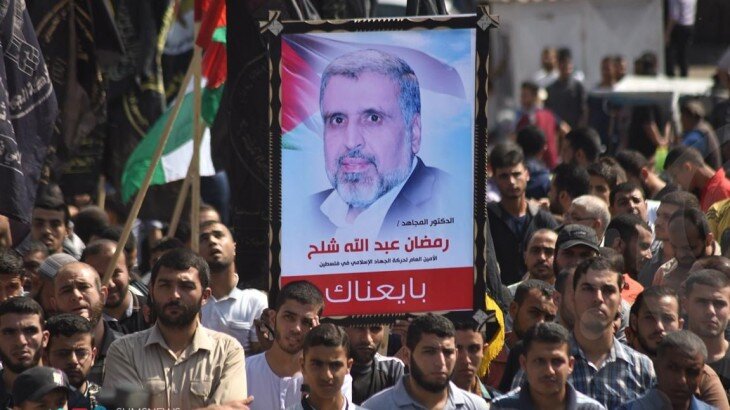Dr. Ramadan Abdullah Shallah, a freedom fighter and former secretary general of the Palestinian Islamic Jihad Movement, died on June 9, after a long illness. This pious and hard-working Mujahid and thinker devoted his entire life of struggle against the usurping Zionist regime in support and defense of the aspirations of the oppressed people of Palestine.
Ramadan Abdullah was one of the leading figures in the Palestinian people’s struggle who founded a very important organization called the Islamic Forerunners, along with the late Martyr Fathi Shaqaqi, when he was at Al-Zagazig University in Egypt. In fact, he received a bachelor’s degree in economics from Al-Zagazig University in Egypt in 1981, where he met Martyr Fathi Shaqaqi.
Dr. Ramadan Abdullah proposed the formation of a jihadist organization in 1978, but he joined a group called Islamic Forerunners founded by Martyr Fathi Shaqaqi. In fact, the Islamic Forerunners are considered to be the pioneers creating the Islamic Jihad Movement. The first secretary general of the Islamic Jihad Movement was the late Fathi Shaqaqi, who was martyred by Mossad on Malta Island in 1995. After the martyrdom of Fathi Shaqaqi, Mr. Abdullah Shallah took over as the secretary general, with the endorsement of a council formed by the movement.
Abdullah Shallah was also an academic and political figure, and taught at the University of South Florida for many years. But later, when he was elected secretary general, he left the United States and joined the ranks of the revolutionaries. Over the past nearly three decades, the late Abdullah Shallah, the secretary general of the Islamic Jihad Movement, was able to form a very important organization in the Gaza Strip, the West Bank and the region, raising the number of members of the Islamic Jihad Movement to a very high level.
He recorded valuable services in the field of struggle and was able to bring all the Palestinian jihadist movements closer together. Although the views of the Islamic Jihad Movement are ideologically different from those of Hamas, the late Abdullah Shallah was able to bring Hamas’ views closer to the Islamic Jihad Movement.
Many Salafis and Wahhabis also opposed Abdullah Shallah because they believed that he was very close to the Shia current, Hezbollah and Iran. It is a fact that, far from religious and ideological differences, he was able to bring together all the struggles of the Palestinian people. At the same time, in his speeches, he considered the views of the Islamic Republic of Iran to be a strategic view of the Palestinian issue, and argued that religious differences should not affect the Palestinian question. Thus, over the past three decades, the Islamic Jihad has become a very important movement after Hamas, during which time it has played a prominent role in organizing the struggles within Gaza and the West Bank. This led to the formation of a broad front in the struggles of the Palestinian people within the occupied territories.
At the same time, Abdullah Shallah’s outlooks were very close to those of Hezbollah and Hassan Nasrallah. His views were also very fair and balanced, and this angered the Salafi and Wahhabi circles. Therefore, in general, the late Abdullah Shallah was very influential in bringing the views of the Palestinian militant movements closer, including Hamas, the People’s Front for the Liberation of Palestine, the National Struggle Front and even the “Fatah”, and this is one of his most important achievements during his service.
Finally, it should be noted that Mr. Ziyad al-Nakhala, the current Secretary General of the Islamic Jihad Movement, has held this position for the past two years due to Abdullah Shallah’s illness. Nakhala has followed Shallah’s outlooks during this time. Of course, because the late Abdullah Shallah was known in international circles as an academic figure, he was more acceptable than Nakhala. However, Nakhala also has 30 years of experience working with the Islamic Jihad Movement and has benefited greatly from the experiences of the late Fathi Shaqaqi and the late Abdullah Shallah in his policies. Ultimately, although Abdullah Shallah’s absence will create a political and combat vacuum for the Islamic Jihad Movement, but since the movement does not depend on individuals it will continue to operate as a stable and rooted institution.










0 Comments